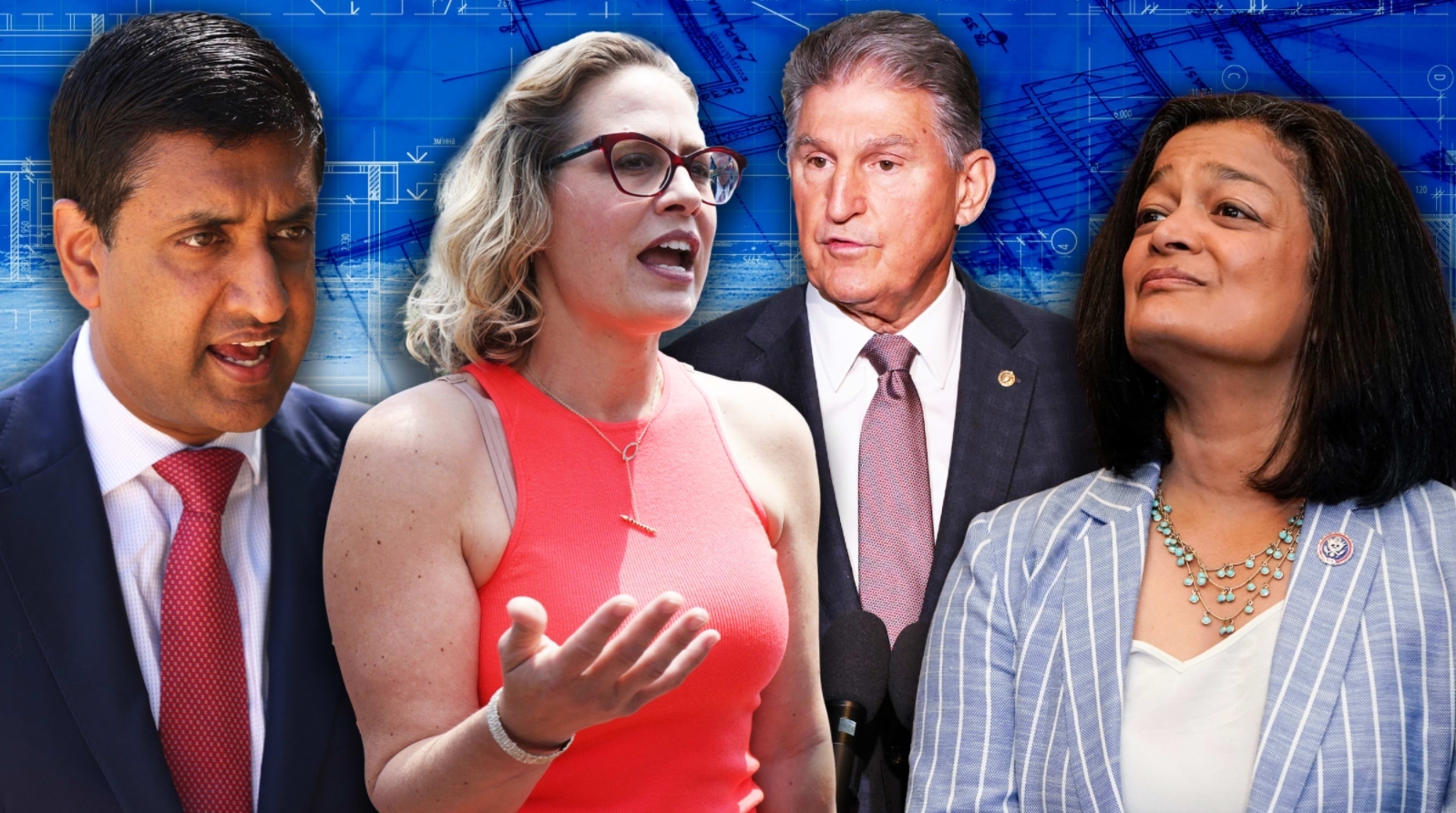Welcome to DU!
The truly grassroots left-of-center political community where regular people, not algorithms, drive the discussions and set the standards.
Join the community:
Create a free account
Support DU (and get rid of ads!):
Become a Star Member
Latest Breaking News
Editorials & Other Articles
General Discussion
The DU Lounge
All Forums
Issue Forums
Culture Forums
Alliance Forums
Region Forums
Support Forums
Help & Search
General Discussion
Showing Original Post only (View all)Cutting Massive Bill Threatens to Blow Up Progressive Unity [View all]
Deciding what programs are removed from the multi-trillion proposal will almost certainly splinter a group of lawmakers who surprised Capitol Hill with their unity just weeks ago.https://www.thedailybeast.com/cutting-massive-bill-threatens-to-blow-up-progressive-unity

Democrats promised to Build Back Better in the Joe Biden era, but the political reality surrounding their marquee policy package is forcing them to pick between two far more diminished mantras: Do Less Better, or Do More Worse. Over the summer, Democrats laid the groundwork for a sprawling $3.5 trillion bill that would substantially fund a number of their top priorities, from expanding Medicare to include dental and vision benefits, to implementing aggressive new climate change measures, to making community college tuition free and pre-K universal. But a group of centrists are objecting to the size and scope of that proposal, and with Democrats unable to lose a single vote in the U.S. Senate, lawmakers are moving toward a smaller package that could end up investing $2 trillion less than what leaders set out to. That prospect sets up painful decisions for Democrats, particularly progressives, about which items to prioritize and which to table. But it’s also sparking a broader debate that is scrambling factional lines within the party—and could complicate the unified front that has made the progressive wing an effective force in negotiations so far.
The more moderate wing of the party prefers the Do Less Better mantra: pick a set of programs that are most vital and give them piles of long-term funding, with the goal of creating stable and successful initiatives that Democrats can campaign on for years. That would likely encompass things like making the child tax credit permanent and implementing universal paid leave. Progressives, meanwhile, largely prefer the Do More Worse approach—though they probably would not call it that. They believe they now have a rare opportunity to enact the sweeping legislation voters elected them to pass and must maintain the vast scope of the legislation, even if they can only fund much of it for a short time. Some lawmakers are convinced that these programs will be so popular that it could help keep the party in power, or at least make it near-impossible for the GOP to repeal them. Rep. Ro Khanna (D-CA), a leading progressive, has proposed that funding for key programs run out after the 2024 presidential elections, enabling the party to put them “on the ballot” that year. “I am confident that by ’24, these programs would have proved very popular,” Khanna told The Daily Beast.
Others look at recent history and don’t see that fight going their way. They feel that Republicans would gladly run against these programs, and either way worry that GOP control of Congress or the gridlock of divided government would ensure that Democrats’ signature bill is dismantled in just a few years. “The wisdom that popular policies will inevitably be extended is largely untested in this political climate,” said one progressive advocate. “And even if you believe it, it depends on things being implemented before the midterms or the general.” In general, there’s some trepidation among even solid progressives about the risks involved with the caucus’ official approach. “A mile wide and an inch deep is not a very durable approach,” said Rep. Jared Huffman (D-CA), who added that Democrats are “on the horns of a dilemma.” That dilemma comes as the White House and congressional leadership aim to close in on a deal that gets all Democrats on board with the legislation by the end of October. And this upcoming round of complex, high-stakes talks is set to challenge progressives’ most valuable resource so far: their unity.
At the end of September, Progressive Caucus Chair Pramila Jayapal (D-WA) and her team kept dozens of liberal lawmakers in line on a threat to tank a $1 trillion bipartisan infrastructure bill—if it weren’t paired with significant progress on the larger package. On Oct. 1, Biden came to the Hill and personally affirmed that position during a caucus-wide meeting, delivering progressives a huge win. “The strength of the progressive caucus has been an unusual stretch of unity over these past few months,” said Huffman. The nature of this debate, however, is more complicated than the infrastructure standoff. The vast legislation at hand consists of dozens and dozens of smaller proposals that some lawmakers have championed their entire careers, not to mention the varying constituencies and advocacy groups that wield enormous power in the Democratic coalition. Progressive Caucus leaders said the ongoing debate amounts to a “false choice,” insisting that lawmakers can reach a broad segment of the population with well-funded programs. But multiple Democrats worried that the fight over how to shave as much as $2 trillion from the legislation could pit lawmakers against one another as they scrap to save their own personal priorities or those of their allies.
snip
6 replies
 = new reply since forum marked as read
Highlight:
NoneDon't highlight anything
5 newestHighlight 5 most recent replies
= new reply since forum marked as read
Highlight:
NoneDon't highlight anything
5 newestHighlight 5 most recent replies
yes, certain forces, small in number but great in power, want to break them on the wheel
Celerity
Oct 2021
#2
The CPC could support Do Less Better, then hold the debt ceiling hostage for the rest
Fiendish Thingy
Oct 2021
#3
the howls of outrage from a certain small but extremely loud group will be deafening
Celerity
Oct 2021
#6